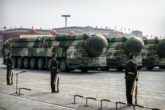February 25, 2021
Stemming the Flow: The United States Needs a Strategy to Address China’s Strategic Exportation of Digital Authoritarianism
Many of China’s technology companies perfect their products in the domestic market by facilitating the party-state’s oppression and data control, and subsequently seek to export the technology to fledgling authoritarian states or nations with fragile democracies. This is part of Beijing’s strategy to enhance its digital instruments of national power, normalize illiberal uses of technology, and equip foreign governments with the tools to replicate aspects of the CCP’s authoritarian governance model. If Washington wants to blunt this strategy, the US government needs to implement a comprehensive strategy of its own to address this.
Many of China’s technology companies perfect their products in the domestic market by facilitating the party-state’s oppression and data control, and subsequently seek to export the technology to fledgling authoritarian states or nations with fragile democracies.
As the Chinese economy grew exponentially over the past couple decades, so did its capacity to support technological innovation. China’s tech giants have flourished, responding to the demand of a rapidly digitizing population by developing much-needed technology and digital services. A growing proportion of this new technology is classified as dual-use technology, which gathers data that can be processed to facilitate authoritarian practices even when its original intended use case was benign. Dual-use technology is not unique to China, but China is the only country producing such technology at scale within an authoritarian system. Furthermore, Beijing’s national security and cybersecurity laws preclude companies from having any official recourse when instructed to comply with the government on nebulous national security matters.
Still, companies willingly seek opportunities to work with the government in order to test and refine their technology, even when the projects limit civil liberties. For example, surveillance and AI developers such as Hikvision and iFlytek have partnered with authorities in Xinjiang to facilitate the oppression of the region’s Uyghur minority. In the short term, the party-state benefits from an increased level of control and the partner companies acquire lucrative contracts. Over the long term, both parties benefit from marketing the technology abroad as “tried and true” tools that make authoritarian rule easier.
Read the full article from the Georgetown Journal of International Affairs.
More from CNAS
-
America’s Self-Loathing Is a Losing Hand
This article was originally published in The Washington Post.Around 10 years ago, the United States began a historic shift in its grand strategy toward China, abandoning the b...
By David Feith
-
Indo-Pacific Security / Energy, Economics & Security / Technology & National Security
Selling AI Chips Won’t Keep China Hooked on U.S. TechnologyU.S. policy should not rest on the illusion that selling chips can trap China inside the American tech ecosystem....
By Janet Egan
-
Will New Delhi-Beijing Move Beyond Friction Points? | Ex-White Official On India-China Reset
Prime Minister Narendra Modi on Friday said that India and China, as two major economies, must work together to bring stability to the global economic order. NDTV's Gaurie Dwi...
By Lisa Curtis
-
How Big Will China’s Nuclear Arsenal Get?
China’s nuclear expansion is already feeding an arms race—a contest that is accelerating partly because the finish line remains unknown....
By Jacob Stokes




